Exploring Contemporary Tourism Development and its Key Impacts
VerifiedAdded on 2023/06/09
|8
|2077
|289
Essay
AI Summary
This essay provides a comprehensive analysis of contemporary tourism development, highlighting its significance as a global phenomenon. It delves into the economic, environmental, and socio-cultural impacts of tourism, examining both positive and negative consequences. The essay explores factors influencing tourism development, including political, economic, social, technological, and environmental aspects. It discusses how tourism contributes to economic growth through infrastructure development, job creation, and foreign exchange earnings, while also acknowledging potential negative impacts such as harm to local interests and increased costs. Furthermore, the essay addresses the environmental impact of tourism, including pollution and resource depletion, as well as positive initiatives like ecotourism. Finally, it examines the socio-cultural effects of tourism, considering changes in values and community structures. The essay concludes by emphasizing the need for sustainable tourism practices to mitigate negative impacts and maximize the benefits for both tourists and host communities. Desklib offers a variety of resources including past papers and solved assignments for students.
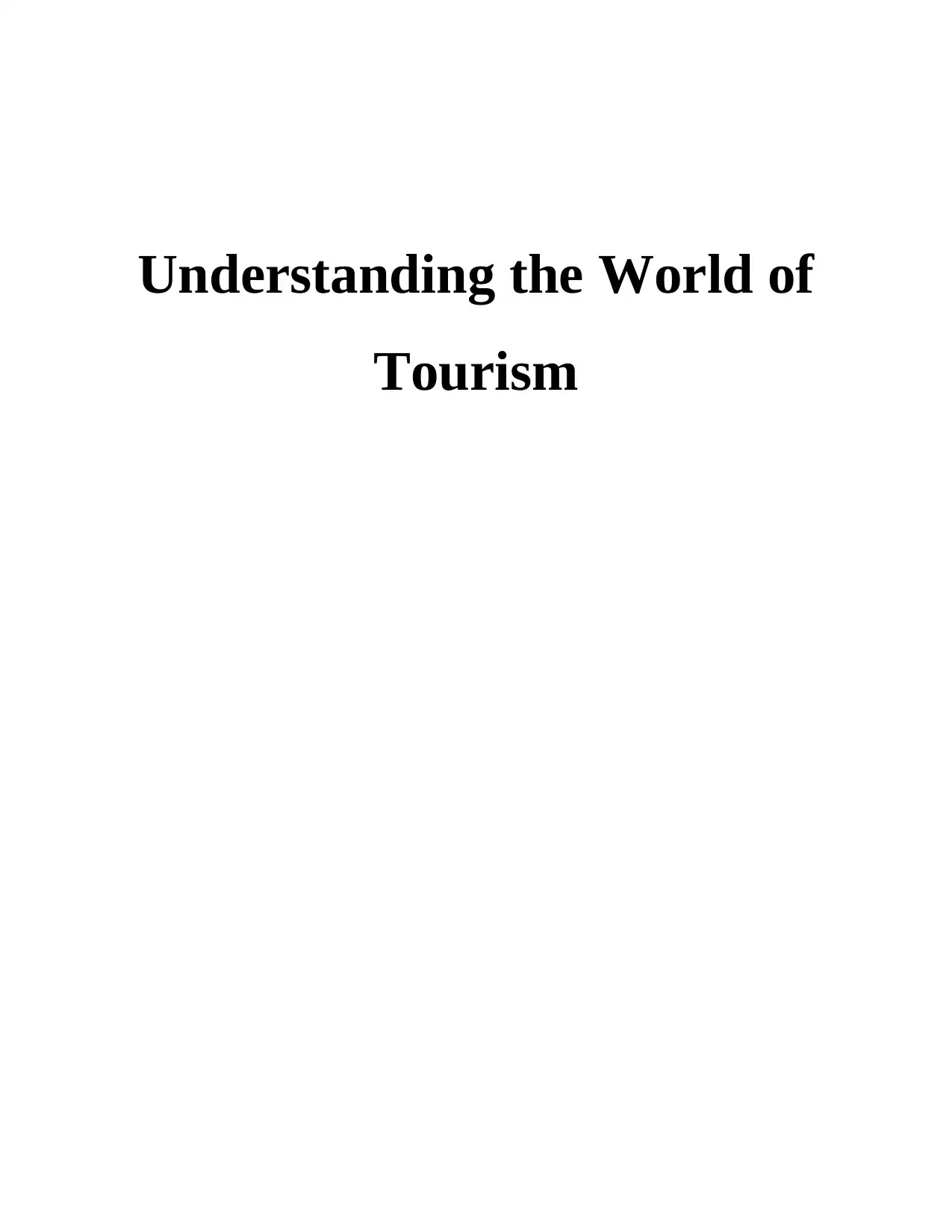
Understanding the World of
Tourism
Tourism
Paraphrase This Document
Need a fresh take? Get an instant paraphrase of this document with our AI Paraphraser
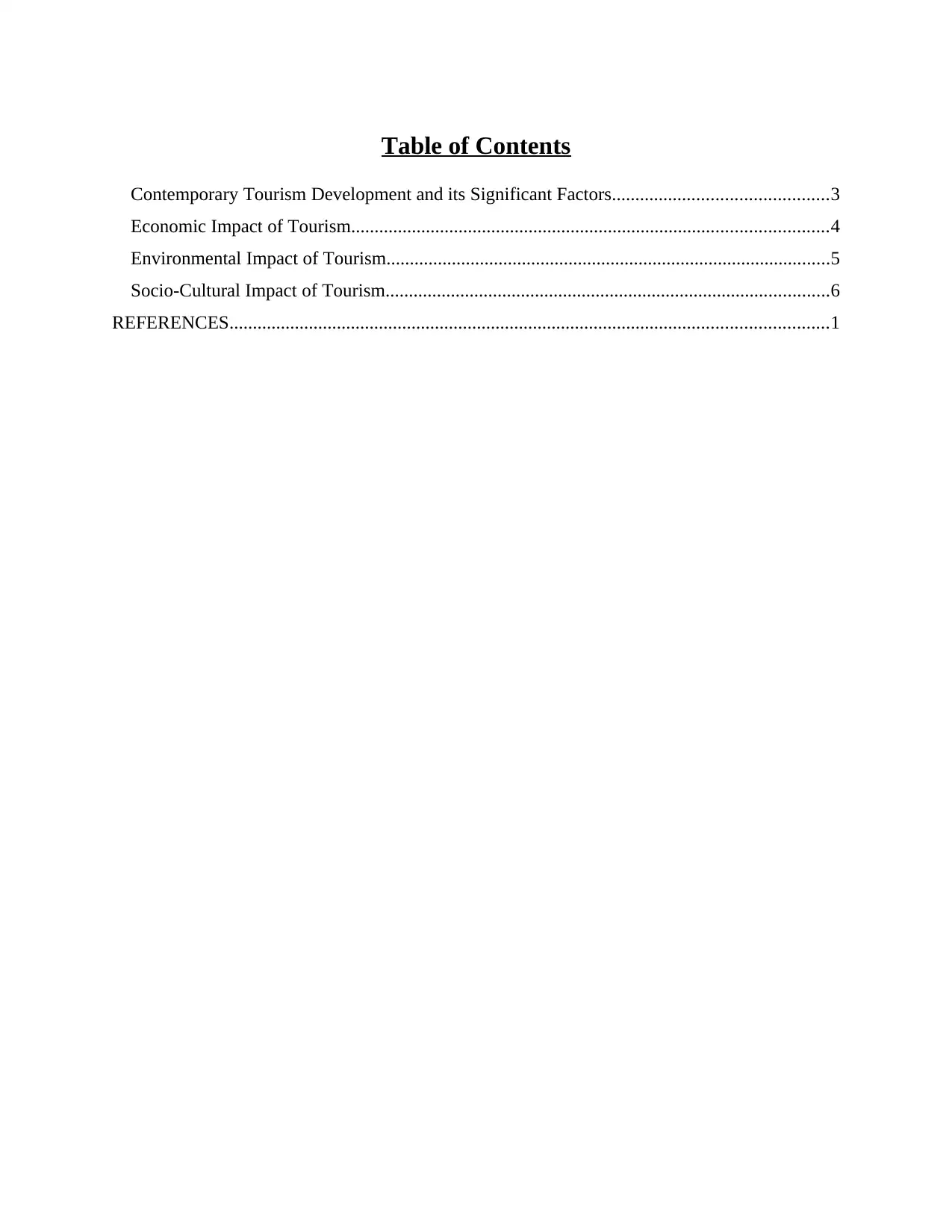
Table of Contents
Contemporary Tourism Development and its Significant Factors..............................................3
Economic Impact of Tourism......................................................................................................4
Environmental Impact of Tourism...............................................................................................5
Socio-Cultural Impact of Tourism...............................................................................................6
REFERENCES................................................................................................................................1
Contemporary Tourism Development and its Significant Factors..............................................3
Economic Impact of Tourism......................................................................................................4
Environmental Impact of Tourism...............................................................................................5
Socio-Cultural Impact of Tourism...............................................................................................6
REFERENCES................................................................................................................................1
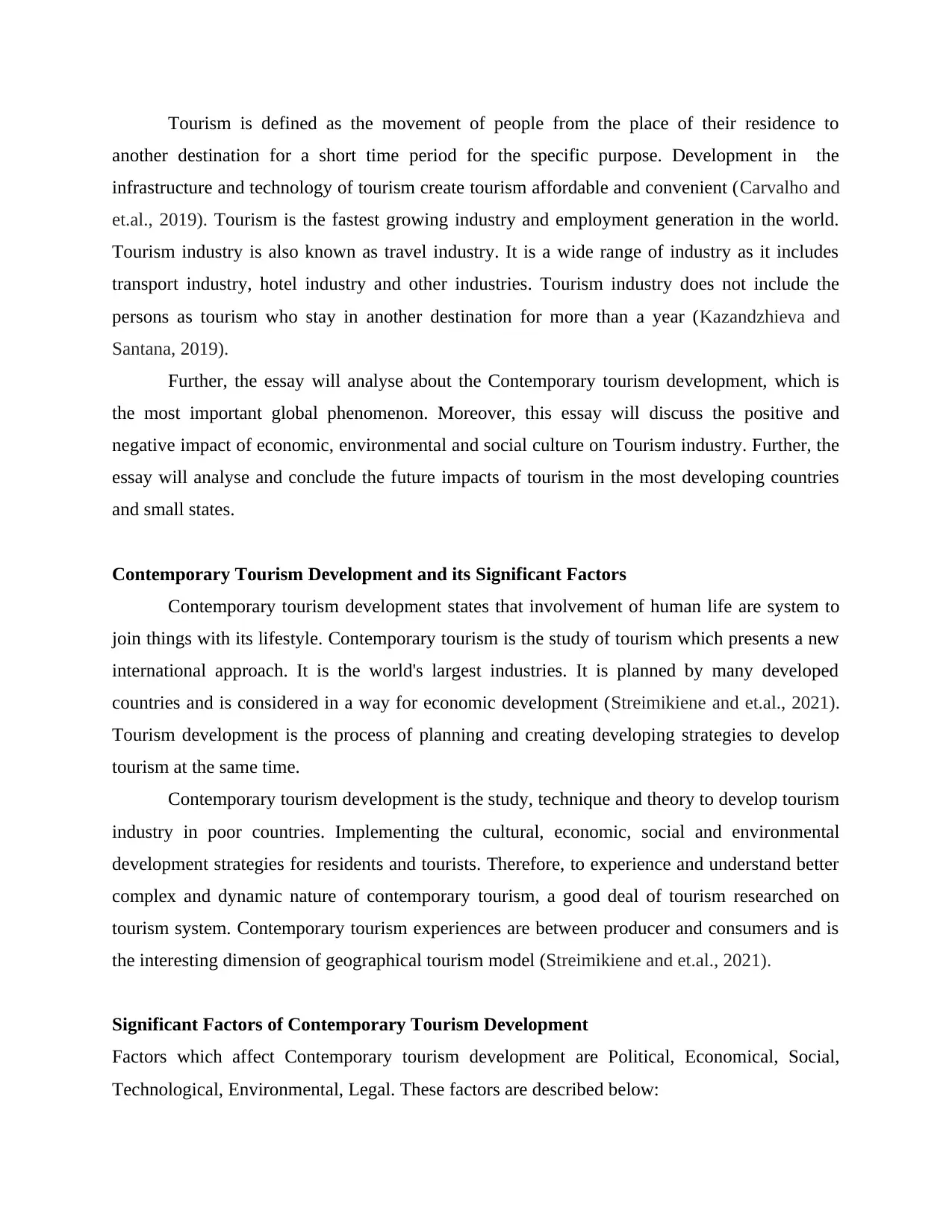
Tourism is defined as the movement of people from the place of their residence to
another destination for a short time period for the specific purpose. Development in the
infrastructure and technology of tourism create tourism affordable and convenient (Carvalho and
et.al., 2019). Tourism is the fastest growing industry and employment generation in the world.
Tourism industry is also known as travel industry. It is a wide range of industry as it includes
transport industry, hotel industry and other industries. Tourism industry does not include the
persons as tourism who stay in another destination for more than a year (Kazandzhieva and
Santana, 2019).
Further, the essay will analyse about the Contemporary tourism development, which is
the most important global phenomenon. Moreover, this essay will discuss the positive and
negative impact of economic, environmental and social culture on Tourism industry. Further, the
essay will analyse and conclude the future impacts of tourism in the most developing countries
and small states.
Contemporary Tourism Development and its Significant Factors
Contemporary tourism development states that involvement of human life are system to
join things with its lifestyle. Contemporary tourism is the study of tourism which presents a new
international approach. It is the world's largest industries. It is planned by many developed
countries and is considered in a way for economic development (Streimikiene and et.al., 2021).
Tourism development is the process of planning and creating developing strategies to develop
tourism at the same time.
Contemporary tourism development is the study, technique and theory to develop tourism
industry in poor countries. Implementing the cultural, economic, social and environmental
development strategies for residents and tourists. Therefore, to experience and understand better
complex and dynamic nature of contemporary tourism, a good deal of tourism researched on
tourism system. Contemporary tourism experiences are between producer and consumers and is
the interesting dimension of geographical tourism model (Streimikiene and et.al., 2021).
Significant Factors of Contemporary Tourism Development
Factors which affect Contemporary tourism development are Political, Economical, Social,
Technological, Environmental, Legal. These factors are described below:
another destination for a short time period for the specific purpose. Development in the
infrastructure and technology of tourism create tourism affordable and convenient (Carvalho and
et.al., 2019). Tourism is the fastest growing industry and employment generation in the world.
Tourism industry is also known as travel industry. It is a wide range of industry as it includes
transport industry, hotel industry and other industries. Tourism industry does not include the
persons as tourism who stay in another destination for more than a year (Kazandzhieva and
Santana, 2019).
Further, the essay will analyse about the Contemporary tourism development, which is
the most important global phenomenon. Moreover, this essay will discuss the positive and
negative impact of economic, environmental and social culture on Tourism industry. Further, the
essay will analyse and conclude the future impacts of tourism in the most developing countries
and small states.
Contemporary Tourism Development and its Significant Factors
Contemporary tourism development states that involvement of human life are system to
join things with its lifestyle. Contemporary tourism is the study of tourism which presents a new
international approach. It is the world's largest industries. It is planned by many developed
countries and is considered in a way for economic development (Streimikiene and et.al., 2021).
Tourism development is the process of planning and creating developing strategies to develop
tourism at the same time.
Contemporary tourism development is the study, technique and theory to develop tourism
industry in poor countries. Implementing the cultural, economic, social and environmental
development strategies for residents and tourists. Therefore, to experience and understand better
complex and dynamic nature of contemporary tourism, a good deal of tourism researched on
tourism system. Contemporary tourism experiences are between producer and consumers and is
the interesting dimension of geographical tourism model (Streimikiene and et.al., 2021).
Significant Factors of Contemporary Tourism Development
Factors which affect Contemporary tourism development are Political, Economical, Social,
Technological, Environmental, Legal. These factors are described below:
⊘ This is a preview!⊘
Do you want full access?
Subscribe today to unlock all pages.

Trusted by 1+ million students worldwide
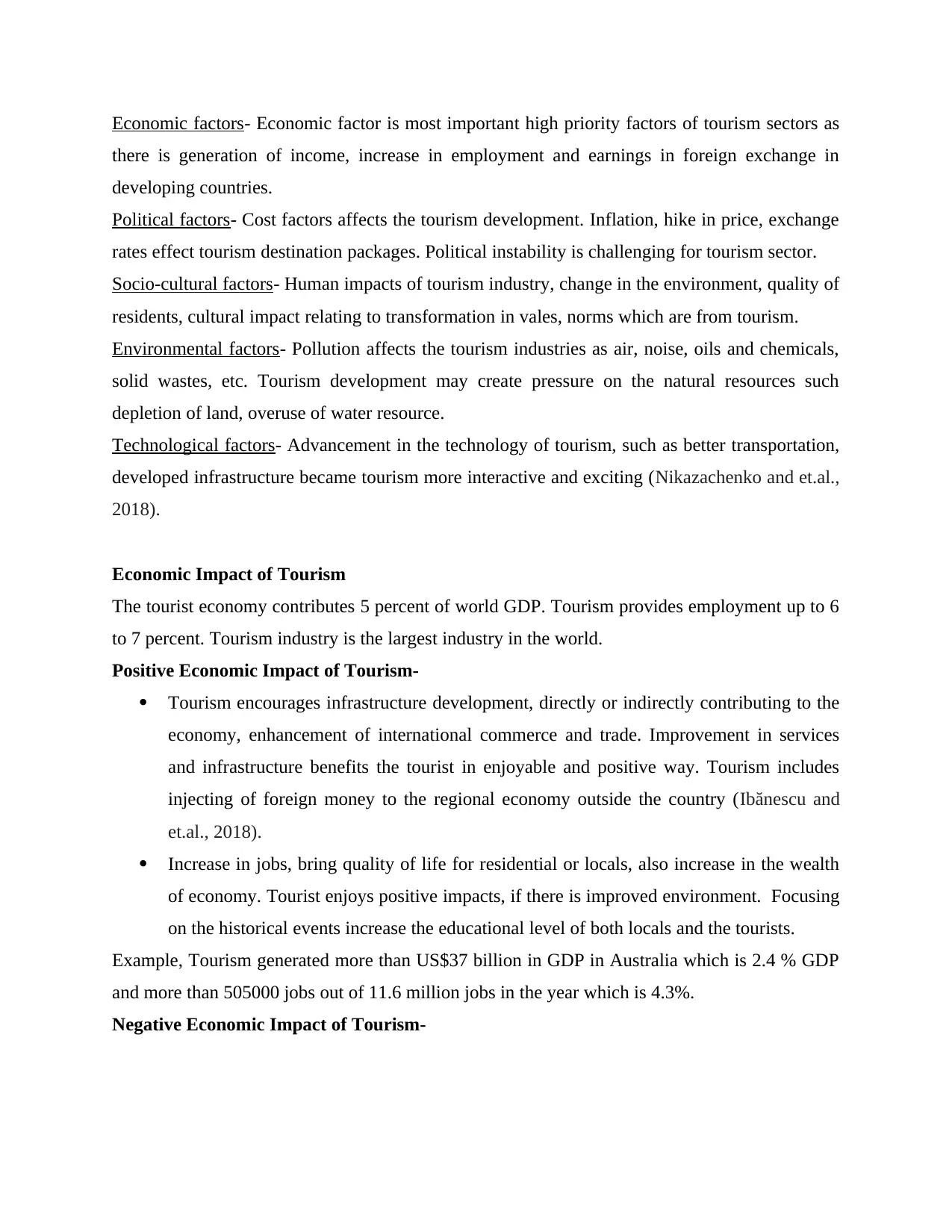
Economic factors- Economic factor is most important high priority factors of tourism sectors as
there is generation of income, increase in employment and earnings in foreign exchange in
developing countries.
Political factors- Cost factors affects the tourism development. Inflation, hike in price, exchange
rates effect tourism destination packages. Political instability is challenging for tourism sector.
Socio-cultural factors- Human impacts of tourism industry, change in the environment, quality of
residents, cultural impact relating to transformation in vales, norms which are from tourism.
Environmental factors- Pollution affects the tourism industries as air, noise, oils and chemicals,
solid wastes, etc. Tourism development may create pressure on the natural resources such
depletion of land, overuse of water resource.
Technological factors- Advancement in the technology of tourism, such as better transportation,
developed infrastructure became tourism more interactive and exciting (Nikazachenko and et.al.,
2018).
Economic Impact of Tourism
The tourist economy contributes 5 percent of world GDP. Tourism provides employment up to 6
to 7 percent. Tourism industry is the largest industry in the world.
Positive Economic Impact of Tourism-
Tourism encourages infrastructure development, directly or indirectly contributing to the
economy, enhancement of international commerce and trade. Improvement in services
and infrastructure benefits the tourist in enjoyable and positive way. Tourism includes
injecting of foreign money to the regional economy outside the country (Ibănescu and
et.al., 2018).
Increase in jobs, bring quality of life for residential or locals, also increase in the wealth
of economy. Tourist enjoys positive impacts, if there is improved environment. Focusing
on the historical events increase the educational level of both locals and the tourists.
Example, Tourism generated more than US$37 billion in GDP in Australia which is 2.4 % GDP
and more than 505000 jobs out of 11.6 million jobs in the year which is 4.3%.
Negative Economic Impact of Tourism-
there is generation of income, increase in employment and earnings in foreign exchange in
developing countries.
Political factors- Cost factors affects the tourism development. Inflation, hike in price, exchange
rates effect tourism destination packages. Political instability is challenging for tourism sector.
Socio-cultural factors- Human impacts of tourism industry, change in the environment, quality of
residents, cultural impact relating to transformation in vales, norms which are from tourism.
Environmental factors- Pollution affects the tourism industries as air, noise, oils and chemicals,
solid wastes, etc. Tourism development may create pressure on the natural resources such
depletion of land, overuse of water resource.
Technological factors- Advancement in the technology of tourism, such as better transportation,
developed infrastructure became tourism more interactive and exciting (Nikazachenko and et.al.,
2018).
Economic Impact of Tourism
The tourist economy contributes 5 percent of world GDP. Tourism provides employment up to 6
to 7 percent. Tourism industry is the largest industry in the world.
Positive Economic Impact of Tourism-
Tourism encourages infrastructure development, directly or indirectly contributing to the
economy, enhancement of international commerce and trade. Improvement in services
and infrastructure benefits the tourist in enjoyable and positive way. Tourism includes
injecting of foreign money to the regional economy outside the country (Ibănescu and
et.al., 2018).
Increase in jobs, bring quality of life for residential or locals, also increase in the wealth
of economy. Tourist enjoys positive impacts, if there is improved environment. Focusing
on the historical events increase the educational level of both locals and the tourists.
Example, Tourism generated more than US$37 billion in GDP in Australia which is 2.4 % GDP
and more than 505000 jobs out of 11.6 million jobs in the year which is 4.3%.
Negative Economic Impact of Tourism-
Paraphrase This Document
Need a fresh take? Get an instant paraphrase of this document with our AI Paraphraser
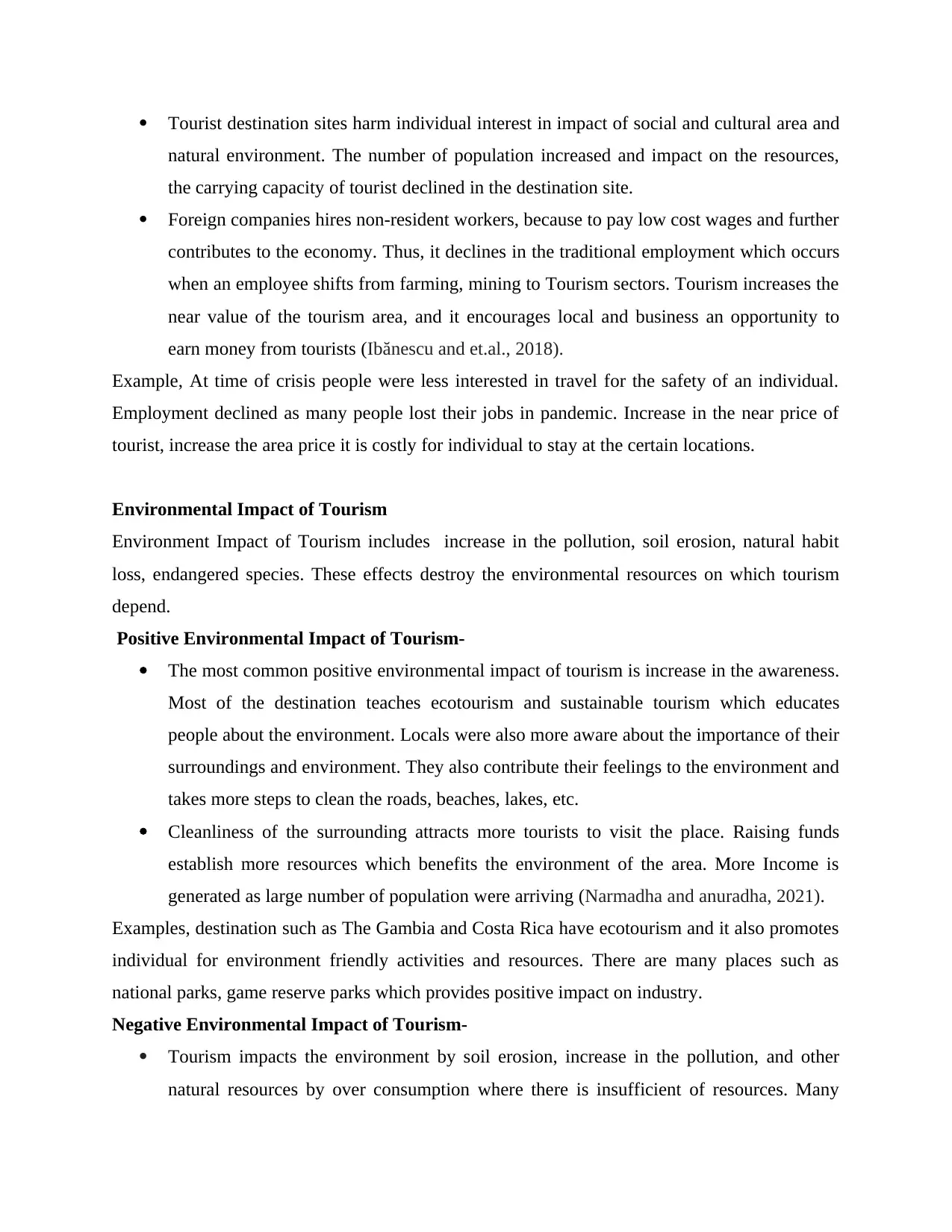
Tourist destination sites harm individual interest in impact of social and cultural area and
natural environment. The number of population increased and impact on the resources,
the carrying capacity of tourist declined in the destination site.
Foreign companies hires non-resident workers, because to pay low cost wages and further
contributes to the economy. Thus, it declines in the traditional employment which occurs
when an employee shifts from farming, mining to Tourism sectors. Tourism increases the
near value of the tourism area, and it encourages local and business an opportunity to
earn money from tourists (Ibănescu and et.al., 2018).
Example, At time of crisis people were less interested in travel for the safety of an individual.
Employment declined as many people lost their jobs in pandemic. Increase in the near price of
tourist, increase the area price it is costly for individual to stay at the certain locations.
Environmental Impact of Tourism
Environment Impact of Tourism includes increase in the pollution, soil erosion, natural habit
loss, endangered species. These effects destroy the environmental resources on which tourism
depend.
Positive Environmental Impact of Tourism-
The most common positive environmental impact of tourism is increase in the awareness.
Most of the destination teaches ecotourism and sustainable tourism which educates
people about the environment. Locals were also more aware about the importance of their
surroundings and environment. They also contribute their feelings to the environment and
takes more steps to clean the roads, beaches, lakes, etc.
Cleanliness of the surrounding attracts more tourists to visit the place. Raising funds
establish more resources which benefits the environment of the area. More Income is
generated as large number of population were arriving (Narmadha and anuradha, 2021).
Examples, destination such as The Gambia and Costa Rica have ecotourism and it also promotes
individual for environment friendly activities and resources. There are many places such as
national parks, game reserve parks which provides positive impact on industry.
Negative Environmental Impact of Tourism-
Tourism impacts the environment by soil erosion, increase in the pollution, and other
natural resources by over consumption where there is insufficient of resources. Many
natural environment. The number of population increased and impact on the resources,
the carrying capacity of tourist declined in the destination site.
Foreign companies hires non-resident workers, because to pay low cost wages and further
contributes to the economy. Thus, it declines in the traditional employment which occurs
when an employee shifts from farming, mining to Tourism sectors. Tourism increases the
near value of the tourism area, and it encourages local and business an opportunity to
earn money from tourists (Ibănescu and et.al., 2018).
Example, At time of crisis people were less interested in travel for the safety of an individual.
Employment declined as many people lost their jobs in pandemic. Increase in the near price of
tourist, increase the area price it is costly for individual to stay at the certain locations.
Environmental Impact of Tourism
Environment Impact of Tourism includes increase in the pollution, soil erosion, natural habit
loss, endangered species. These effects destroy the environmental resources on which tourism
depend.
Positive Environmental Impact of Tourism-
The most common positive environmental impact of tourism is increase in the awareness.
Most of the destination teaches ecotourism and sustainable tourism which educates
people about the environment. Locals were also more aware about the importance of their
surroundings and environment. They also contribute their feelings to the environment and
takes more steps to clean the roads, beaches, lakes, etc.
Cleanliness of the surrounding attracts more tourists to visit the place. Raising funds
establish more resources which benefits the environment of the area. More Income is
generated as large number of population were arriving (Narmadha and anuradha, 2021).
Examples, destination such as The Gambia and Costa Rica have ecotourism and it also promotes
individual for environment friendly activities and resources. There are many places such as
national parks, game reserve parks which provides positive impact on industry.
Negative Environmental Impact of Tourism-
Tourism impacts the environment by soil erosion, increase in the pollution, and other
natural resources by over consumption where there is insufficient of resources. Many
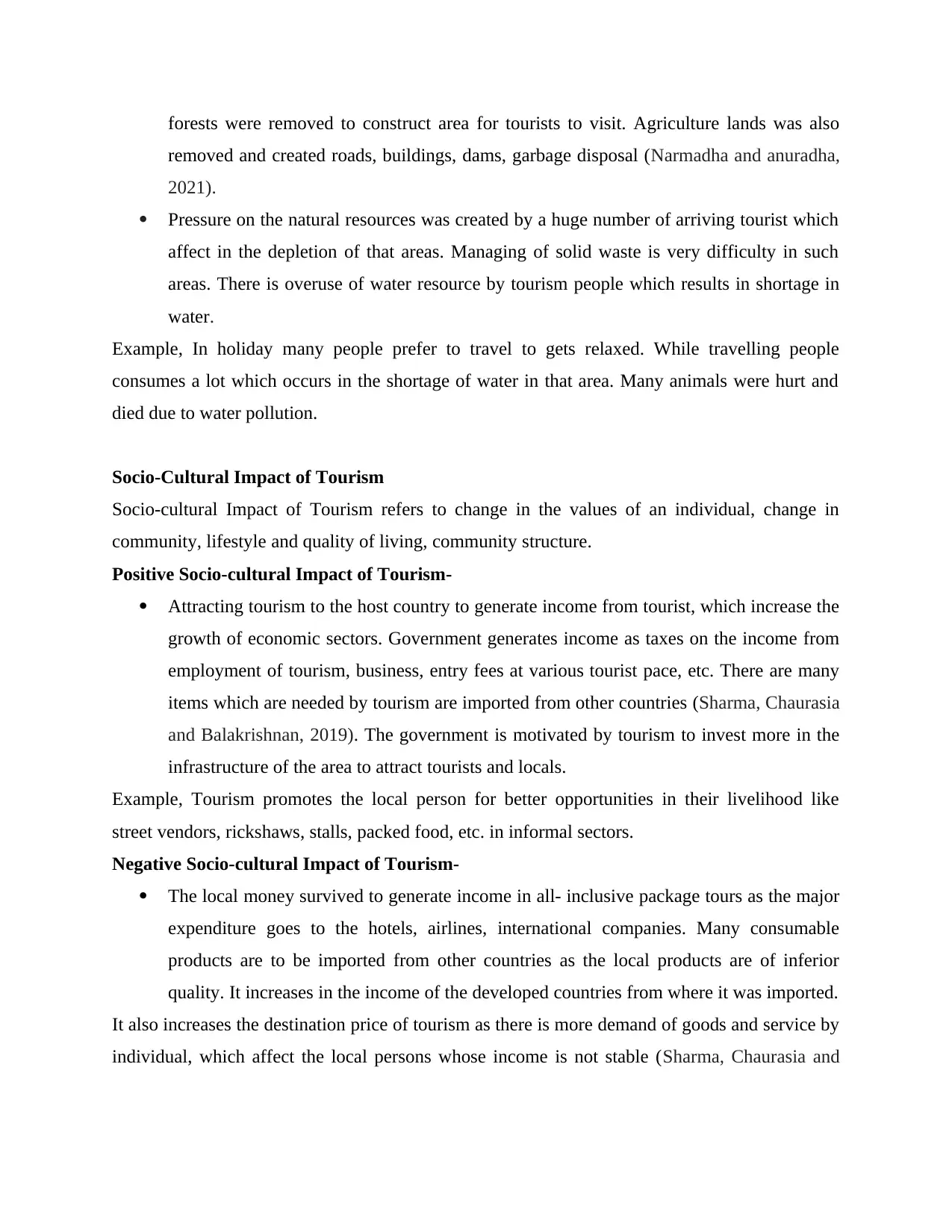
forests were removed to construct area for tourists to visit. Agriculture lands was also
removed and created roads, buildings, dams, garbage disposal (Narmadha and anuradha,
2021).
Pressure on the natural resources was created by a huge number of arriving tourist which
affect in the depletion of that areas. Managing of solid waste is very difficulty in such
areas. There is overuse of water resource by tourism people which results in shortage in
water.
Example, In holiday many people prefer to travel to gets relaxed. While travelling people
consumes a lot which occurs in the shortage of water in that area. Many animals were hurt and
died due to water pollution.
Socio-Cultural Impact of Tourism
Socio-cultural Impact of Tourism refers to change in the values of an individual, change in
community, lifestyle and quality of living, community structure.
Positive Socio-cultural Impact of Tourism-
Attracting tourism to the host country to generate income from tourist, which increase the
growth of economic sectors. Government generates income as taxes on the income from
employment of tourism, business, entry fees at various tourist pace, etc. There are many
items which are needed by tourism are imported from other countries (Sharma, Chaurasia
and Balakrishnan, 2019). The government is motivated by tourism to invest more in the
infrastructure of the area to attract tourists and locals.
Example, Tourism promotes the local person for better opportunities in their livelihood like
street vendors, rickshaws, stalls, packed food, etc. in informal sectors.
Negative Socio-cultural Impact of Tourism-
The local money survived to generate income in all- inclusive package tours as the major
expenditure goes to the hotels, airlines, international companies. Many consumable
products are to be imported from other countries as the local products are of inferior
quality. It increases in the income of the developed countries from where it was imported.
It also increases the destination price of tourism as there is more demand of goods and service by
individual, which affect the local persons whose income is not stable (Sharma, Chaurasia and
removed and created roads, buildings, dams, garbage disposal (Narmadha and anuradha,
2021).
Pressure on the natural resources was created by a huge number of arriving tourist which
affect in the depletion of that areas. Managing of solid waste is very difficulty in such
areas. There is overuse of water resource by tourism people which results in shortage in
water.
Example, In holiday many people prefer to travel to gets relaxed. While travelling people
consumes a lot which occurs in the shortage of water in that area. Many animals were hurt and
died due to water pollution.
Socio-Cultural Impact of Tourism
Socio-cultural Impact of Tourism refers to change in the values of an individual, change in
community, lifestyle and quality of living, community structure.
Positive Socio-cultural Impact of Tourism-
Attracting tourism to the host country to generate income from tourist, which increase the
growth of economic sectors. Government generates income as taxes on the income from
employment of tourism, business, entry fees at various tourist pace, etc. There are many
items which are needed by tourism are imported from other countries (Sharma, Chaurasia
and Balakrishnan, 2019). The government is motivated by tourism to invest more in the
infrastructure of the area to attract tourists and locals.
Example, Tourism promotes the local person for better opportunities in their livelihood like
street vendors, rickshaws, stalls, packed food, etc. in informal sectors.
Negative Socio-cultural Impact of Tourism-
The local money survived to generate income in all- inclusive package tours as the major
expenditure goes to the hotels, airlines, international companies. Many consumable
products are to be imported from other countries as the local products are of inferior
quality. It increases in the income of the developed countries from where it was imported.
It also increases the destination price of tourism as there is more demand of goods and service by
individual, which affect the local persons whose income is not stable (Sharma, Chaurasia and
⊘ This is a preview!⊘
Do you want full access?
Subscribe today to unlock all pages.

Trusted by 1+ million students worldwide
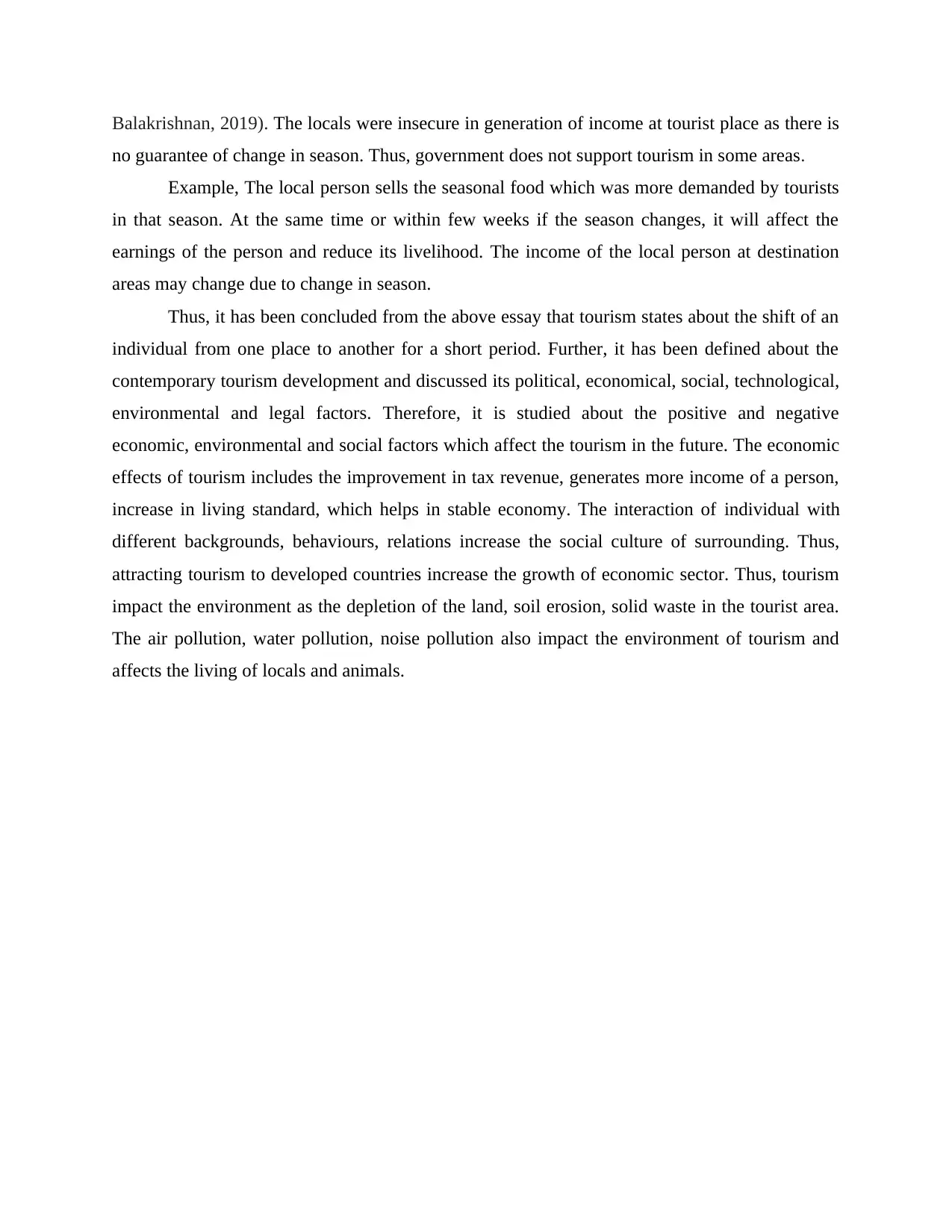
Balakrishnan, 2019). The locals were insecure in generation of income at tourist place as there is
no guarantee of change in season. Thus, government does not support tourism in some areas.
Example, The local person sells the seasonal food which was more demanded by tourists
in that season. At the same time or within few weeks if the season changes, it will affect the
earnings of the person and reduce its livelihood. The income of the local person at destination
areas may change due to change in season.
Thus, it has been concluded from the above essay that tourism states about the shift of an
individual from one place to another for a short period. Further, it has been defined about the
contemporary tourism development and discussed its political, economical, social, technological,
environmental and legal factors. Therefore, it is studied about the positive and negative
economic, environmental and social factors which affect the tourism in the future. The economic
effects of tourism includes the improvement in tax revenue, generates more income of a person,
increase in living standard, which helps in stable economy. The interaction of individual with
different backgrounds, behaviours, relations increase the social culture of surrounding. Thus,
attracting tourism to developed countries increase the growth of economic sector. Thus, tourism
impact the environment as the depletion of the land, soil erosion, solid waste in the tourist area.
The air pollution, water pollution, noise pollution also impact the environment of tourism and
affects the living of locals and animals.
no guarantee of change in season. Thus, government does not support tourism in some areas.
Example, The local person sells the seasonal food which was more demanded by tourists
in that season. At the same time or within few weeks if the season changes, it will affect the
earnings of the person and reduce its livelihood. The income of the local person at destination
areas may change due to change in season.
Thus, it has been concluded from the above essay that tourism states about the shift of an
individual from one place to another for a short period. Further, it has been defined about the
contemporary tourism development and discussed its political, economical, social, technological,
environmental and legal factors. Therefore, it is studied about the positive and negative
economic, environmental and social factors which affect the tourism in the future. The economic
effects of tourism includes the improvement in tax revenue, generates more income of a person,
increase in living standard, which helps in stable economy. The interaction of individual with
different backgrounds, behaviours, relations increase the social culture of surrounding. Thus,
attracting tourism to developed countries increase the growth of economic sector. Thus, tourism
impact the environment as the depletion of the land, soil erosion, solid waste in the tourist area.
The air pollution, water pollution, noise pollution also impact the environment of tourism and
affects the living of locals and animals.
Paraphrase This Document
Need a fresh take? Get an instant paraphrase of this document with our AI Paraphraser
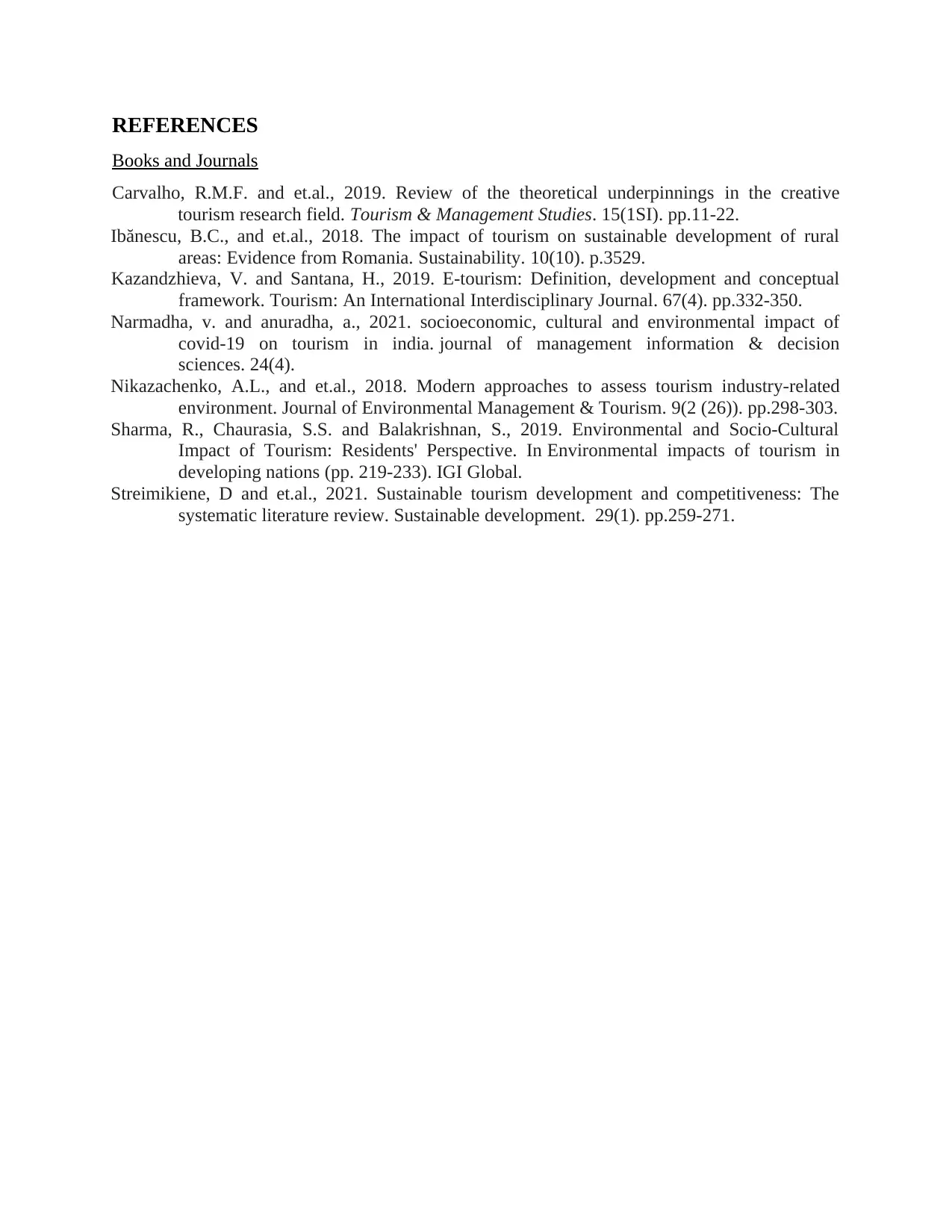
REFERENCES
Books and Journals
Carvalho, R.M.F. and et.al., 2019. Review of the theoretical underpinnings in the creative
tourism research field. Tourism & Management Studies. 15(1SI). pp.11-22.
Ibănescu, B.C., and et.al., 2018. The impact of tourism on sustainable development of rural
areas: Evidence from Romania. Sustainability. 10(10). p.3529.
Kazandzhieva, V. and Santana, H., 2019. E-tourism: Definition, development and conceptual
framework. Tourism: An International Interdisciplinary Journal. 67(4). pp.332-350.
Narmadha, v. and anuradha, a., 2021. socioeconomic, cultural and environmental impact of
covid-19 on tourism in india. journal of management information & decision
sciences. 24(4).
Nikazachenko, A.L., and et.al., 2018. Modern approaches to assess tourism industry-related
environment. Journal of Environmental Management & Tourism. 9(2 (26)). pp.298-303.
Sharma, R., Chaurasia, S.S. and Balakrishnan, S., 2019. Environmental and Socio-Cultural
Impact of Tourism: Residents' Perspective. In Environmental impacts of tourism in
developing nations (pp. 219-233). IGI Global.
Streimikiene, D and et.al., 2021. Sustainable tourism development and competitiveness: The
systematic literature review. Sustainable development. 29(1). pp.259-271.
Books and Journals
Carvalho, R.M.F. and et.al., 2019. Review of the theoretical underpinnings in the creative
tourism research field. Tourism & Management Studies. 15(1SI). pp.11-22.
Ibănescu, B.C., and et.al., 2018. The impact of tourism on sustainable development of rural
areas: Evidence from Romania. Sustainability. 10(10). p.3529.
Kazandzhieva, V. and Santana, H., 2019. E-tourism: Definition, development and conceptual
framework. Tourism: An International Interdisciplinary Journal. 67(4). pp.332-350.
Narmadha, v. and anuradha, a., 2021. socioeconomic, cultural and environmental impact of
covid-19 on tourism in india. journal of management information & decision
sciences. 24(4).
Nikazachenko, A.L., and et.al., 2018. Modern approaches to assess tourism industry-related
environment. Journal of Environmental Management & Tourism. 9(2 (26)). pp.298-303.
Sharma, R., Chaurasia, S.S. and Balakrishnan, S., 2019. Environmental and Socio-Cultural
Impact of Tourism: Residents' Perspective. In Environmental impacts of tourism in
developing nations (pp. 219-233). IGI Global.
Streimikiene, D and et.al., 2021. Sustainable tourism development and competitiveness: The
systematic literature review. Sustainable development. 29(1). pp.259-271.
1 out of 8
Related Documents
Your All-in-One AI-Powered Toolkit for Academic Success.
+13062052269
info@desklib.com
Available 24*7 on WhatsApp / Email
![[object Object]](/_next/static/media/star-bottom.7253800d.svg)
Unlock your academic potential
Copyright © 2020–2026 A2Z Services. All Rights Reserved. Developed and managed by ZUCOL.


